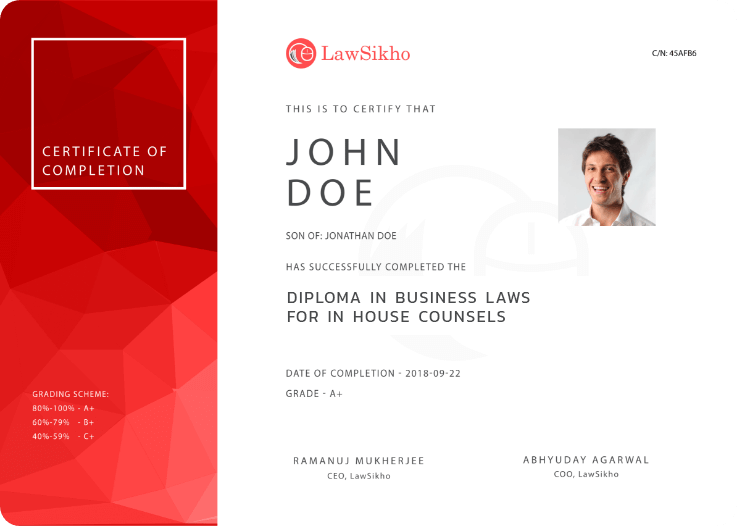Do you know the biggest challenge faced by law students?
They do not know about the work performed by IP lawyers every day!
Unfortunately, searching on the internet does not provide those insights. You can try it out for yourself.
One does not develop expertise in intellectual property laws by reading the Copyright Act, the Trademarks Act or the Patents Act, or reading about the TRIPs Agreement (Trade-Related Aspects of Intellectual Property Rights). One has to understand the everyday work performed by intellectual property lawyers by working in a law firm, as litigators, or as in-house counsels and learn that.
Some law students restrict their learning to registration work under trademarks, copyright or patent law. In their worldview, this is all that exists in the world of intellectual property law.
Not true! Registration work is the lowest end of the value chain for lawyers. Margins charged for registration services are razor-thin, and the market is very competitive.
There are various other categories of work, such as prosecution, licensing work and contracts, and litigation work, described in more detail below, which are much more rewarding and profitable.
It is not sufficient to learn registration-related work alone to be job-ready. One needs to be able to draft contracts and various kinds of opposition documents, appeals and litigation-related documents.
Our 5-step method to identify your interest and prepare for a career in intellectual property laws
The first step is to understand the different types of work performed by intellectual property lawyers.
What is the everyday work of an in-house counsel in intellectual-property focussed industries?
What does a client want from an IP law firm?
What is the work of an intellectual property litigator?
How is the work in the media and entertainment sector different from, say, the fashion industry or counterfeiting work?
How is trademark licensing different from media and entertainment contracts?
Learning the actual work performed by other intellectual property lawyers in different roles provides a better understanding of what is expected from you.
You will learn about this through four live classes, study materials, templates and exercises.
What are the problems faced by clients who approach intellectual property lawyers? How do lawyers help them in protecting their brand? How do they initiate actions if someone uses a similar brand name?
What arrangements do clients enter into to monetize their brand? How do lawyers help them in executing such arrangements or taking actions for a breach?
How are actors, directors and other service providers commissioned to create a movie? What forms of arrangements do they enter into to distribute films? What are the commercials of such arrangements? What are the risks in such arrangements?
How does an intellectual property lawyer perform this work for the client? What does his or her output to the client look like?
Self-study, reading case laws, or advice from seniors does not address these questions.
Can you learn this through internships? The real problem statements faced by partners and associates seldom trickle down to the intern. You get to work on a minuscule portion of the problem.
Now, it is extremely difficult to imagine these situations on one’s own and try solving them. In fact, it can take a few months or even years in law school to learn what you can learn in a month.
However, attempting 6 practical exercises in a month will give you the experience of serving a client as an intellectual property lawyer. Imagine solving the real problems dealt with by IP lawyers through exercises in the course. How can one not learn from that?
We curate the situations and training to give you an experience of the most important skills, and that is why you are able to quickly make progress.
You will need to go through the ride to be able to grasp this aspect.
Feedback is very important to improve performance. However, it is rarely provided in our education system.
Although you are given marks for any exam that you attempt or a moot court memorial, there are limited opportunities to specifically identify where and how you can improve in future.
Where it is available, feedback is extremely generic, and you may not receive concrete action points and corrections.
What if you received detailed in-line coaching on how to improve your drafts?
What if you had the opportunity to raise any doubts you faced while attempting the problem or ask further questions on the feedback that you received?
Will it enhance your practical learning and improve your drafting skills?
Will it prepare you better for an internship, or an interview, or a job?
Identification of mistakes and how to improve in future enables you to make rapid progress, march ahead of others, even if they have been reading and studying for months or years.
After you have exposure to the different types of work performed by intellectual property lawyers, you are finally in a position to identify whether you want to learn all aspects of intellectual property laws deeply or whether you want to specialize in a specific kind of work.
Both have different kinds of career opportunities.
For example, if you want to work as an independent practitioner or start an intellectual property law firm, having a generalized understanding of trademark prosecution and litigation, trademark licensing, media and entertainment contracts and a broad understanding of patent prosecution and licensing will be extremely useful to advise your own clients, or to hire partners and juniors for different types of work.
If you specialize in one area, such as media and entertainment laws, you can work in the media and entertainment practice of a law firm such as Naik & Naik, or an in-house counsel at a production house (e.g. Excel Entertainment), or as an in-house counsel in a technology company which has an OTT app.
If you specialize in patents, you can expect to get work related to telecom, pharmaceutical, biotechnology, manufacturing (occasionally), and similar industries.
If you want to be a litigator, you may choose to learn various kinds of infringement, passing-off litigation work, criminal and customs-related enforcement aspects of intellectual property.
Now, most young lawyers complete their law school journey having a vague idea of how to cultivate their passion for intellectual property laws.
In contrast, you will be able to arrive at this point in one month.
From here onward, you can acquire the skills necessary to build a career of your choice, create a portfolio of work, publish articles and use these accomplishments to secure real-life opportunities.
Every step that you take will make you progress by leaps and bounds.
Those who want to proceed with further specialization and build their career in intellectual property laws will also have the opportunity to pursue in-depth learning in their chosen field of interest through our Executive Certificate and Diploma courses and build further expertise.
Once you have done some focussed skill-acquisition on intellectual property laws, it is time to seek out opportunities!
Apart from performing simulation exercises, we will also guide you on sharing your learnings in your professional network and reaching out to seniors and mentors.
Many of our students have been able to secure work or internship and job opportunities because of persistent outreach efforts.
In addition, you will have access to placement assistance from our placement cell for obtaining internships. Every week, we successfully assist tens of law students in securing internships and job opportunities. We had successfully guided 50 law students in securing internships in under two months of lockdown!
Please note that securing internships and jobs are not guaranteed. However, if you follow the advice given by the placement cell, your chances of securing internships and job opportunities will significantly increase.
You must ensure that you complete all the course work to be eligible for support from our placement cell. You may be asked to acquire additional expertise as well on a subject, or expand your portfolio of work, to ensure that your applications are relevant to the organizations that you want to work at.
In some cases, the placement cell may advise you to improve upon basics, such as written English or grammar, which you should act upon.
This will maximise your chances of success.
Class Agenda
Class 1: Overview of a trademarks-focussed IPR practice/ trademarks team
Types of Work Performed for Brand Protection: Registration Work, Trademark Watch Services, Prosecution, Licensing, Litigation
Industries that need trademarks services
Offshore trademarks-related work for Indian lawyers
Exercise:
Identify the scope of work to protect a big multinational brand
Conduct a trademark search for a client in the restaurant business
Advice on appropriate trademark classes for registration and monetization strategy
Explain what happens if there is an objection
Class 2: Overview of a media and entertainment laws’ practice
Overview of statutory compliance-related issues, controversies and litigation
Movie creation work
Content acquisition work and types of distribution/ exploitation contracts
Advertising in films
Exercise:
Prepare a list of contracts that a regional language movie producer will require for the following:
Creation of content
Acquisition of content from other content creators
Satellite, digital and theatrical exploitation in India
Further monetization through in-film placements
Merchandising (where applicable)
Class 3: Overview of work in a patent law practice
Types of Work Performed in Patent Law Practice: Registration Work, Prosecution Work (Patent Enforcement and NPEs), Licensing and Litigation
Key industries and controversies: Pharma, Software
Unique aspects of patents work Invention Disclosure Form, SEPs,
Offshore patents-related work for Indian lawyers
Exercise:
What can and cannot be patented
How to conduct patent searches
Class 4: Copyright concepts and Takedown notices
Copyrightability
Copyright infringement
How to deal with infringement of copyrights for blog or vlog content
Copyright licensing
Exercise:
Identify which work is copyrightable
Draft a takedown notice




















 ADDICTIVE LEARNING TECHNOLOGY LIMITED
ADDICTIVE LEARNING TECHNOLOGY LIMITED












